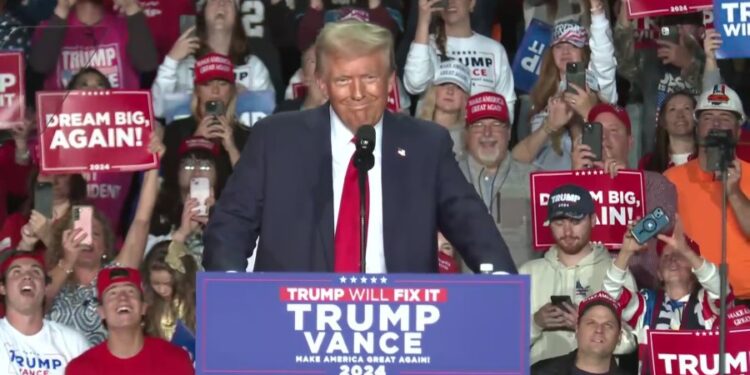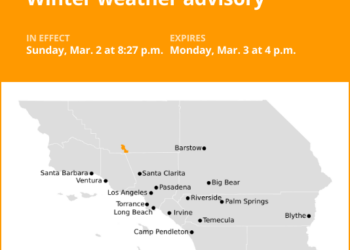
GRAND RAPIDS, Mich. (WOOD) — The city of Grand Rapids says the Donald J. Trump for President 2024 campaign has refused to pay more than $49,000 in bills for two rallies in the city this year.
That is forcing the city to write off those expenses as uncollectable and to reevaluate policies for future campaign visits.
The unpaid invoices are for two rallies that drew thousands into the city, both at the Van Andel Arena.
Grand Rapids billed Trump’s campaign nearly $33,000 for his rally in July — the biggest chunks for overtime for police and its public works department.
The bill was due in October and went unpaid.
“It’s highly unusual to have outstanding bills, especially with someone who clearly had raised enough money from their campaign to pay their bills,” said outgoing Grand Rapids Mayor Rosalynn Bliss.
Federal records show that as of late November, Trump’s campaign had nearly $10 million cash on hand of the $464 million it raised.
The city of Grand Rapids billed the Trump campaign more than $16,000 for his visit on Nov. 4, his last rally of the campaign. Most was for overtime for public works.
That also went unpaid.
Then, there was Vice President Kamala Harris’s rally in October at Riverside Park in Grand Rapids.
City officials said her campaign paid that $2,800 tab up front.
When asked why Harris’ bill was so much less than Trump’s bills, a city spokesman said Trump’s rallies required far more protection, in part because of the location.
“The Trump campaign utilized a venue in a downtown district requiring more road closures and associated safety measures, driving costs,” the city spokesman said in an email to Target 8. “It was also the first event the President-Elect held following the assassination attempt, requiring heightened security.
“The Harris campaign event required the same level of security, but utilized a city park with ample green space, requiring a limited number of road closures and associated safety measures,” he wrote.
Bliss said the unpaid bills are costing taxpayers.
“If the campaign doesn’t pay, ultimately we still have bills to pay and overtime and staffing costs and fencing costs and all the things that go with having a presidential candidate come, especially with the level of security that was required,” Bliss said.
“It’s a huge ask for a city to host when you have a presidential candidate. It takes a ton of work in a very short period of time, and people work overtime. They work really hard to make sure that everyone is safe, and we should be reimbursed for that level of work.”
Target 8 called the phone number listed on city invoices for the Trump campaign, but the voicemail was full. An email sent to the Trump campaign representative listed on the invoices was not answered.
Grand Rapids is not alone. In October, NBC News reported the Trump campaign owed more than $750,000 to four cities and a county across the country, some dating back eight years.
That doesn’t include the $93,000 bill that went unpaid from the city of Battle Creek for a rally in December 2019, city officials said.
In an email to Target 8, a Battle Creek city spokeswoman wrote: “Despite multiple attempts to collect payment, the city was unable to do so and subsequently wrote off the invoice in June 2020.”
She said she was unaware of any other political campaigns with unpaid bills from the city.
“It’s important to note that the city does not automatically invoice political campaigns that visit Battle Creek,” the spokeswoman wrote. “However, the Trump campaign’s December 2019 visit resulted in significant overtime costs.”
In the city of Erie, Pennsylvania, the Trump campaign still owes $40,000 for stops in 2018 and 2023, city spokesman Rob Lee told Target 8. He also hasn’t paid the $63,000 tab for a rally this past September, Lee said.
The city of Erie said it is also waiting for a $70,000 payment from the Harris campaign for a rally in October.
Back in Grand Rapids, a city spokesman told Target 8 in an email that the Trump campaign has referred all requests for payment to the U.S. Secret Service.
But the Secret Service won’t pay.
“The US Secret service has indicated they are not budgeted for such costs,” the Grand Rapids city spokesman wrote.
He said the city is developing policies and processes for future campaign visits, “based on what it’s learned.”
“I hope that we’ll learn from this,” Bliss said. “But the reality is, I think the city should still continue to pursue getting reimbursed. We do that, we have compliance efforts across the city, and if we’re doing compliance to make sure a taxpayer is paying their bills, we should do the same for this.”
From now on, she said, the city should consider getting money up front.
“Maybe on the front end, we ask for a certain amount down or some kind of commitment to paying for the full cost. But I think we need to look at what our current process is, what’s not working,” she said. “How did this happen? And then what we can do in the future to prevent it.”
Incoming Grand Rapids Mayor David LaGrand also said the unpaid bills should lead to a change in protocol.
“If we have a history of somebody not paying, we definitely want to get money up front,” LaGrand said.







